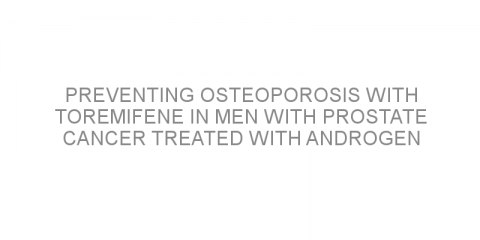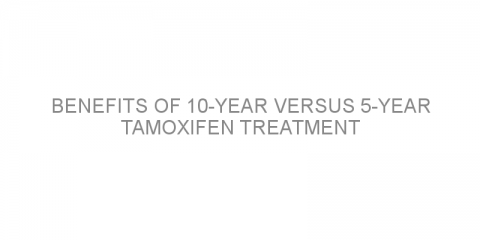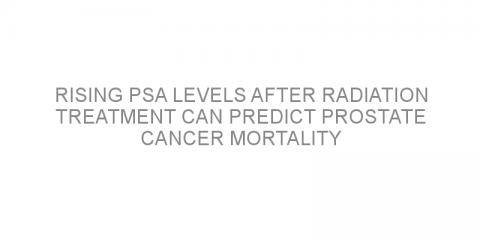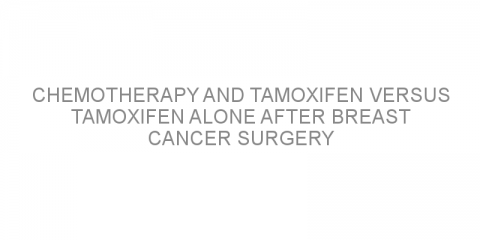In a nutshell This research evaluated whether resistance to hormone therapy can be delayed by giving therapeutic injections with hormone therapy intermittently (start and stop) instead of continuously in patients with prostate cancer. Some background Androgens (testosterone) are male sex hormones which are made mainly in the testicles. They...
Read MoreOngoing treatment(s)-Hormonal therapy Posts on Medivizor
Benefits of radiation therapy after breast-conserving surgery
In a nutshell This study aimed to determine the effectiveness of radiation treatment (RT) given after breast-conserving surgery. The main findings are that RT leads to a dramatic drop in cancer recurrences and a moderately improved survival rate 15 years after the operation. Some background Breast-conserving surgery (BCS) involves the removal of...
Read MorePhase II clinical trial testing the safety and efficacy of adding entinostat to exemestane therapy in hormone-resistant breast cancer patients
In a nutshell This phase II clinical trial tested whether a new drug, entinostat, can work in concert with exemestane (a hormone therapy drug), to fight breast cancer that no longer responds to hormone therapy alone. Some background Some breast cancers need estrogen (a female sex hormone) to grow. These breast cancer cells respond to estrogen via...
Read MoreCombination of Anastrozole and Fulvestrant therapy in hormone receptor positive metastatic breast cancer
In a nutshell This study compared the effect of two regimens for hormone-positive, metastatic breast cancer on disease progression and survival: a combination of two drugs, namely anastrozole (Arimidex) and fulvestrant (Faslodex), versus anastrozole alone. Some background Breast cancers often require estrogen (the female sex...
Read MorePreventing osteoporosis with Toremifene in men with prostate cancer treated with androgen deprivation therapy (ADT)
In a nutshell This article presents the results of a phase III clinical trial that evaluated the safety and efficacy of Toremifene (Acapodene) for lowering fracture risk in men with prostate cancer receiving androgen deprivation therapy (ADT). The risk of spinal fractures was significantly reduced in patients who received Toremifene. Some background...
Read MorePersonalized Tamoxifen Treatments
Most patients on Tamoxifen receive a standard dose of medication. However, patients may benefit more from individually adjusted doses. This paper highlights potential strategies for personalized Tamoxifen treatments. Tamoxifen is not active on its own. Once ingested, the body converts it into other substances (metabolites). Some of these...
Read MoreWell-timed Docetaxel (Taxotere) therapy offers the best results in treating hormone-refractory prostate cancer
In a nutshell This article reports the results of recent studies involving the drug Docetaxel (Taxotere). The drug did not improve overall survival when added to androgen-deprivation therapy. Smaller doses given in shorter treatment cycles were found to be easier to tolerate and more effective. Some background Prostate cancer grows in...
Read MoreComparison between different chemotherapy regimens for early breast cancer
In a nutshell The present study compared the long-term efficacy and safety of different adjuvant chemotherapy regimens for breast cancer. Main results: chemotherapy clearly provides survival benefits; the higher the dosage, the higher the survival rates, despite more toxicity. Some background Many women with early stage breast cancer receive...
Read MoreBenefits of 10-year versus 5-year Tamoxifen treatment
In a nutshell Tamoxifen treatment is given to many breast cancer patients after surgery to prevent recurrences and improve survival. It is usually given for a maximum of 5 years. This study determined that longer treatments offer further survival benefit. Some background Tamoxifen is a drug used against breast cancers which produce...
Read MoreRising PSA levels after radiation treatment can predict prostate cancer mortality
In a nutshell This article evaluated whether the interval to biochemical failure (IBF) can be used as a prediction factor for prostate cancer mortality. The IBF was found to be the best current predictor of prostate cancer mortality in patients previously treated with radiation therapy. Some background Biochemical failure is defined...
Read MorePersonalizing breast cancer treatment based on the genetic “finger-print” of the tumor
This article discusses how tests such as the Oncotype DX or Mammaprint can be used to design individual treatment plans for patients with breast cancer. Patients with stage I and stage II breast cancer are treated similarly. Following surgical removal of a breast tumor, systemic (body-wide) treatment is often used. This secondary treatment is...
Read MoreChemotherapy and Tamoxifen versus Tamoxifen alone after Breast Cancer Surgery
In a nutshell In this study chemotherapy and Tamoxifen were compared to Tamoxifen alone as complementary treatments after surgery for breast cancer. The main finding was that better results are obtained by adding chemotherapy. Some background Tamoxifen is a drug used for tumors which require the female hormone estrogen to grow. It...
Read More













